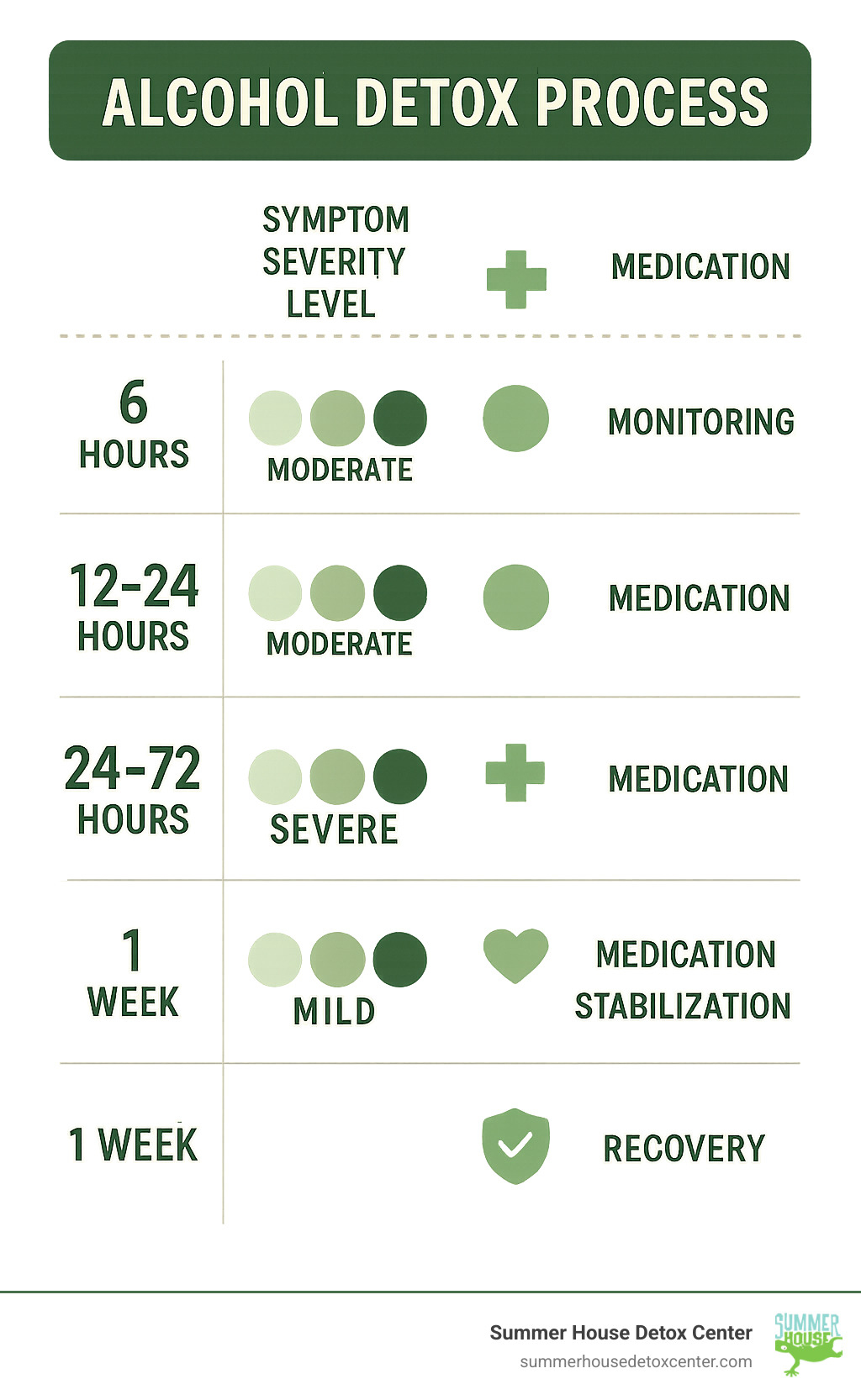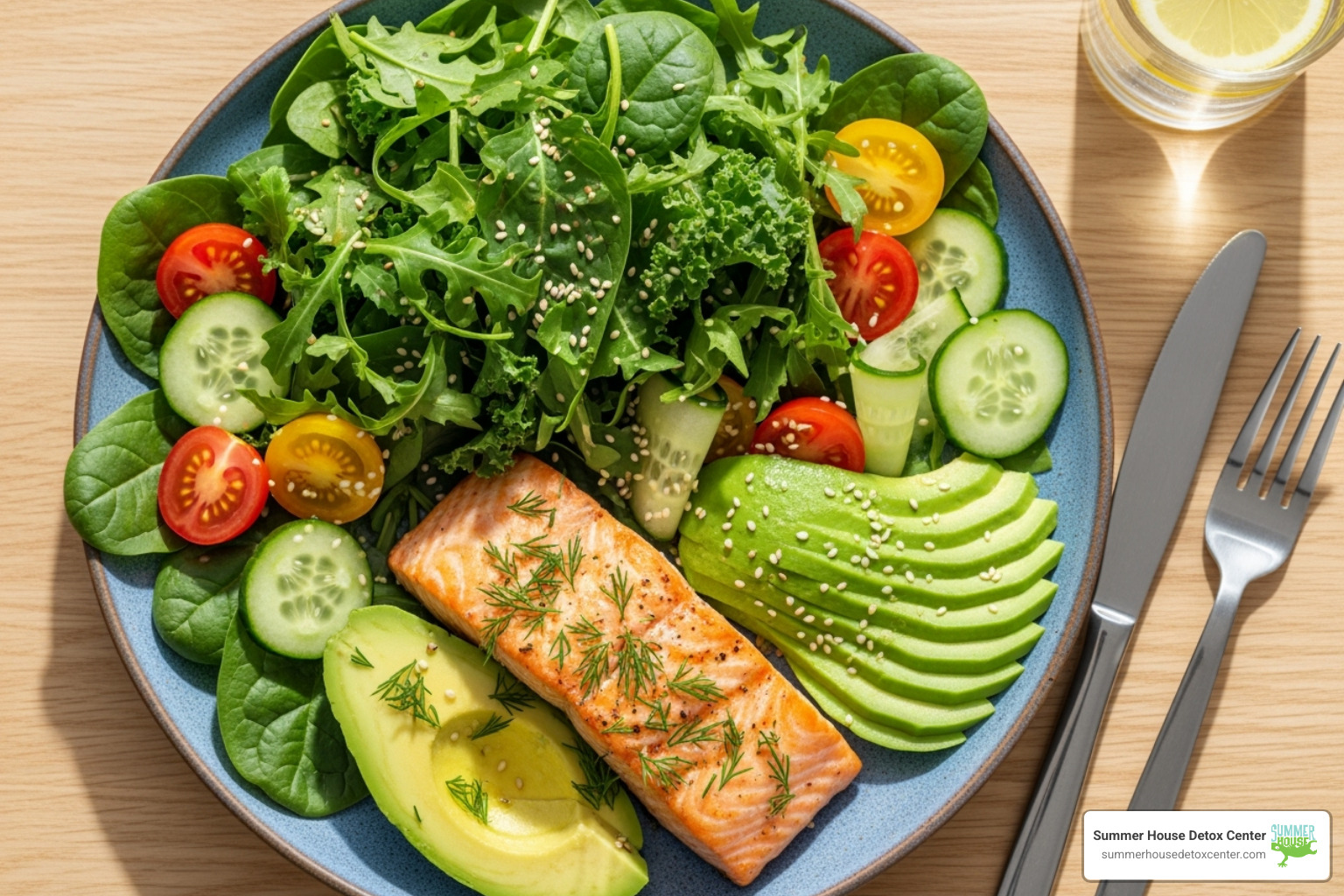Why Understanding Alcohol Detox Can Save Your Life
How do I detox from alcohol safely? This question weighs heavily on the minds of many people struggling with alcohol dependence, especially here in Miami where the party culture can make recovery feel even more challenging.
Quick Answer: Safe Alcohol Detox Steps
- Consult a doctor first – Never attempt detox alone if you’re physically dependent
- Choose medical supervision – Professional detox centers offer 24/7 monitoring
- Expect withdrawal symptoms – These can range from mild anxiety to life-threatening seizures
- Timeline matters – Symptoms typically peak within 24-72 hours after your last drink
- Continue treatment – Detox is just the first step toward long-term recovery
If you’ve been drinking heavily for weeks, months, or years, your body has become physically dependent on alcohol. When you suddenly stop, you may experience serious physical and emotional problems during withdrawal. About 50% of people with alcohol use disorder experience withdrawal symptoms when they stop drinking, and 5-10% may develop life-threatening complications like delirium tremens.
The reality is stark: alcohol withdrawal can be deadly. Seizures, heart complications, and severe dehydration are real risks that make professional medical supervision crucial for anyone with moderate to severe alcohol dependence.
But here’s the hopeful truth – detox is absolutely possible, and thousands of people successfully steer this process every year. With proper medical care, the right environment, and comprehensive support, you can safely eliminate alcohol from your system and begin your journey toward lasting recovery.
In Florida, where Summer House Detox Center serves the Miami community, we understand the unique challenges you face. The fear of withdrawal, past failed attempts, and concerns about judgment are all valid – but they don’t have to stop you from getting the help you deserve.

Find more about how do I detox from alcohol:
Understanding Alcohol Withdrawal: Symptoms and Timeline
Your body becomes remarkably good at adapting to alcohol when you drink regularly. Over time, your central nervous system adjusts to having alcohol – a depressant – constantly present in your system. Think of it like your brain learning to balance on a tilted floor.
When you suddenly remove alcohol, that careful balance gets thrown off completely. Your nervous system, which has been working overtime to counteract alcohol’s depressing effects, suddenly finds itself in overdrive with nothing to slow it down. This is what we call Alcohol Withdrawal Syndrome (AWS).
Here in Miami, we see this every day at Summer House Detox Center. About 50% of people with alcohol use disorder experience withdrawal symptoms when they stop drinking. While that might sound scary, understanding what to expect can help you prepare and seek the right support.
The severity of withdrawal varies dramatically from person to person. Your age, overall health, how long you’ve been drinking, and how much you typically consume all play a role. Some people experience mild discomfort, while others face life-threatening complications like Delirium Tremens (DTs), which affects about 5-10% of people going through withdrawal.
The most important thing to remember? Alcohol withdrawal can be unpredictable and potentially dangerous. This is why the question “how do I detox from alcohol” should always start with talking to a medical professional.
What are the Symptoms of Alcohol Withdrawal?
Withdrawal symptoms typically fall into three categories, and they can overlap or progress from one level to the next. Understanding these patterns helps medical professionals provide the right level of care at the right time.
Mild symptoms usually show up first, often within 6-12 hours after your last drink. You might feel anxious or restless, have trouble sleeping, or experience nausea and sweating. Many people notice their hands shaking – what we commonly call “the shakes” – along with headaches and general irritability.
As withdrawal progresses, moderate symptoms can develop. Your heart rate might increase significantly, and you may feel confused or disoriented. Blood pressure often rises, and the shaking becomes more pronounced. Your body temperature might spike, making you feel feverish even when you’re not sick.
Severe symptoms represent a medical emergency and require immediate professional attention. These can include hallucinations – seeing, hearing, or feeling things that aren’t really there. Seizures are another serious risk, sometimes called “rum fits” in older medical terminology.
The most dangerous complication is Delirium Tremens (DTs). This life-threatening condition involves extreme confusion, vivid and terrifying hallucinations, and dangerous changes in heart rate and blood pressure. Without proper medical care, 5-10% of people with DTs don’t survive.
If you’re in the Miami area and experiencing any severe symptoms – especially seizures or signs of DTs – don’t wait. Get emergency medical help immediately.
The Typical Alcohol Withdrawal Timeline
Every person’s withdrawal experience is unique, but there’s a general pattern that helps medical professionals know what to watch for and when. Understanding this timeline can help you recognize when symptoms might worsen and when you’re likely to start feeling better.
Within 6-12 hours after your last drink, minor symptoms typically begin. You might feel anxious, have trouble sleeping, or start experiencing nausea and sweating. For people with severe alcohol dependence, seizures can actually occur this early, which is why medical supervision is so important from the very beginning.
The 12-24 hour mark often brings intensifying symptoms. This is when some people develop alcoholic hallucinosis – seeing or hearing things that aren’t there, though they usually remain aware that these experiences aren’t real. It’s unsettling but generally not as dangerous as full delirium tremens.
Between 24-72 hours is typically when symptoms peak and when the highest risk for seizures occurs. For those who will develop delirium tremens, this is usually when it begins. However, for most people experiencing mild to moderate withdrawal, symptoms often start improving during this window.
After 72 hours, acute withdrawal symptoms should begin to gradually improve. Most people feel significantly better within a week, though some lingering effects like sleep problems, anxiety, and mood changes can persist for weeks or even months.
For more detailed information about withdrawal timelines, resources like How Long Does It Take to Detox from Alcohol? Timeline and More provide additional medical insights.
This timeline is just a general guide. Your experience might be shorter, longer, or follow a different pattern entirely. That’s exactly why professional medical supervision makes such a difference – trained staff can monitor your specific situation and adjust care as needed.
How Do I Detox From Alcohol? Comparing At-Home vs. Medical Detox
When you’re asking yourself “how do I detox from alcohol,” you’re facing one of the most important decisions of your recovery journey: should you try to detox at home, or seek professional medical help? Here in Miami, where the temptation to handle things on your own can feel strong, it’s crucial to understand what you’re really choosing between.
The dangers of quitting “cold turkey” are real and serious. Your body has adapted to having alcohol in its system, and when you suddenly stop, your central nervous system can go into overdrive. This isn’t just uncomfortable – it can be deadly. We’re talking about seizures, heart complications, and a condition called delirium tremens that can actually kill you.
Let’s be honest about what each option really means for your safety and success:
At-home detox might seem appealing because you’re in familiar surroundings, but the risks are enormous. Without medical supervision, you’re gambling with your life. If seizures or heart problems develop – and they often do without warning – there’s no one there to save you. The success rate for self-detox is disappointingly low, around 30%, mostly because the symptoms become so unbearable that people drink again just to make them stop.
Medical detox, on the other hand, provides 24/7 monitoring by professionals who know exactly what to watch for. You’ll have access to medications that can prevent seizures and make withdrawal much more comfortable. While it costs more upfront, it’s often covered by insurance, and it prevents the much higher costs of emergency room visits or failed attempts.
The reality is that medical supervision isn’t just safer – it’s also more effective. You’re not just surviving withdrawal; you’re preparing for long-term recovery with proper support and planning.
Can You Safely Detox From Alcohol at Home?
For most people with moderate to severe alcohol dependence, the honest answer is no. How do I detox from alcohol safely at home? In most cases, you simply can’t.
The risks of self-detox are unpredictable and frightening. You might start your day feeling anxious and shaky, thinking you can handle this. But within hours, you could be hallucinating or having a seizure. Without medical oversight, these complications can quickly become life-threatening.
Seizures are one of the most serious concerns. They don’t announce themselves – they just happen. If you’re alone, you could fall, hit your head, or worse. People with a history of heavy drinking or previous difficult withdrawals are especially at risk.
Heart failure and other complications are also real possibilities. Your body is under extreme stress during withdrawal, and your heart, liver, and other organs may not be able to handle it alone. Severe dehydration and dangerous changes in your blood chemistry can happen fast.
The low success rate of home detox – around 30% – tells the story. Most people find the symptoms so overwhelming that they drink again just to get relief. It’s not a failure of willpower; it’s your body crying out for help that only medical professionals can provide.
Even if you’re considering a gradual tapering approach rather than stopping abruptly, you need to consult with a doctor first. They can assess your specific situation and determine if home detox might be possible for your particular case, or if medical supervision is essential for your safety.
For more guidance on this topic, you can review resources like Home Detox – Supporting Patients to Overcome Alcohol Addiction.
When is a Professional Medical Detox Program Necessary?
If you’re wondering how do I detox from alcohol safely, a professional medical detox program isn’t just recommended – it’s absolutely necessary if you fall into certain categories.
Heavy or long-term drinking creates physical dependence that your body can’t handle breaking on its own. If you’ve been drinking large amounts regularly for months or years, your system has completely adapted to alcohol’s presence.
History of severe withdrawal is a major red flag. If you’ve experienced seizures, hallucinations, or extreme confusion during previous attempts to quit, you’re at high risk for the same complications – or worse – this time around.
Co-occurring health conditions make withdrawal even more dangerous. Heart disease, liver problems, diabetes, or mental health conditions like anxiety and depression can all complicate the detox process in ways that require immediate medical intervention.
Here in Florida, licensed detox facilities like Summer House Detox Center provide the comprehensive care you need. Our 24/7 medical monitoring means experienced professionals are watching your vital signs and overall health around the clock, ready to step in immediately if complications develop.
Medication management is a game-changer. We use FDA-approved medications to prevent seizures, reduce withdrawal symptoms, and minimize cravings. This isn’t about masking the problem – it’s about keeping you safe while your body heals.
The safe and supportive environment we provide removes you from triggers and stresses of daily life. You can focus entirely on getting better, surrounded by staff who understand your journey – some of whom are in recovery themselves.
Most importantly, we help you transition into the next phase of treatment. Detox is just the beginning. We work with you to address the underlying reasons for your drinking and build the foundation for lasting recovery.
For more detailed information about professional treatment protocols, you can reference Detoxification and substance abuse treatment: A treatment improvement protocol (TIP 45).
Your life is worth the investment in professional care. When you’re ready to take that step, we’re here to support you through every moment of the journey.
Supporting Your Body Through Detox: Nutrition and Hydration
When you’re asking yourself “how do I detox from alcohol” safely, don’t overlook one of your most powerful allies: proper nutrition. Your body has been working overtime to process alcohol, often for months or years. Now it needs the right fuel to heal and recover.
Think of alcohol as a thief that’s been stealing from your body’s nutrient stores. It depletes essential vitamins, disrupts your blood sugar, and leaves you dehydrated. During detox, especially here in Miami’s warm climate, your body is crying out for replenishment.
The good news? The right foods can actually ease withdrawal symptoms and help you feel stronger during this challenging time. When you nourish your body properly, you’re giving yourself the best possible foundation for recovery.

The Best Foods and Nutrients for Alcohol Detox
Hydration comes first, especially in Florida’s heat. Alcohol acts like a sponge, soaking up water from your body and leaving you severely dehydrated. During detox, your body needs water more than ever to flush out toxins and maintain basic functions.
Start with plain water – lots of it. Coconut water can be a great choice too, since it naturally replaces electrolytes without too much added sugar. If you’re sweating more than usual (which is common during withdrawal), these electrolytes become even more important.
B vitamins are your brain’s best friend during detox. Alcohol has likely stripped your body of these crucial nutrients, particularly thiamine (Vitamin B1). Without enough B vitamins, you might feel more confused, tired, or anxious than necessary. The good news is that foods rich in B Vitamins are often delicious and satisfying.
Salmon is like a superfood for detox – it’s packed with B vitamins and those mood-stabilizing omega-3 fatty acids. Leafy greens like spinach and kale might not sound exciting, but they’re powerhouses of nutrition that your body desperately needs right now. Poultry, beans, and lentils provide both B vitamins and steady protein to help repair damaged tissues.
Complex carbohydrates help stabilize the blood sugar roller coaster that many people experience during withdrawal. Instead of reaching for candy or sugary snacks when you feel shaky or irritable, try oats, brown rice, or whole grain bread. These foods provide steady energy without the crash that comes with refined sugar.
Lean proteins are essential for rebuilding and repairing your body. Your liver, in particular, has been working incredibly hard and needs protein to heal. Fish, chicken, eggs, and plant-based proteins like tofu or tempeh are gentle on your digestive system while providing the building blocks your body needs.
Healthy fats might surprise you as a detox essential, but omega-3 fatty acids can actually help stabilize your mood during this emotional time. Walnuts, chia seeds, and flaxseed are easy to add to meals and provide these beneficial fats. Research shows that omega-3s can help with mood disorders, which you can read more about in Omega-3 Fatty Acids and Mood Disorders.
Foods and Drinks to Avoid During Detox
Just as some foods can help your recovery, others can make you feel worse during detox. Your body is already under stress, so avoid adding to that burden with foods that are hard to process.
Processed foods are your enemy right now. Those packaged snacks, frozen dinners, and fast food items are loaded with chemicals, preservatives, and artificial ingredients that your recovering liver doesn’t need to deal with. Your body needs real, whole foods that provide actual nutrition.
High sugar content foods might seem tempting when you’re feeling low energy, but they’ll send your blood sugar on a wild ride. The crash that follows can make anxiety, irritability, and fatigue much worse. If you’re craving something sweet, reach for fresh fruit instead.
Greasy and fried foods are particularly hard on your digestive system and liver. Right now, these organs are working overtime to process the alcohol leaving your system. Don’t make their job harder with foods that require extra effort to break down.
Excessive caffeine might seem like a good idea when you’re feeling tired, but it can actually worsen many withdrawal symptoms. Too much coffee or energy drinks can increase anxiety, make tremors worse, and interfere with the sleep your body desperately needs. One cup of coffee is usually fine, but don’t overdo it.
Dehydration is already a major concern during detox, and caffeine can make it worse. In Miami’s climate, this becomes even more important to consider.
For more insights on supporting your liver during this process, check out Detoxing Your Liver: Fact Versus Fiction.
Proper nutrition during detox isn’t just about feeling better physically – it’s about giving your brain and body the tools they need to heal. When you’re well-nourished and hydrated, you’re setting yourself up for success in the challenging but rewarding journey ahead.
The Path Forward: Treatment After Detox
Completing detox is a tremendous accomplishment, but it’s important to understand that it’s just the beginning of your recovery journey. Think of detox as clearing the fog – it removes alcohol from your system and stabilizes you physically, but the real work of building a fulfilling, alcohol-free life starts now.

Many people wonder how do I detox from alcohol and assume that once they’ve gotten through withdrawal, they’re “cured.” The truth is, detox addresses the physical dependence, but alcohol use disorder involves complex psychological, emotional, and behavioral patterns that developed over time. These underlying issues need attention to prevent relapse and build lasting sobriety.
At Summer House Detox Center, we understand that saying goodbye to alcohol is both an ending and a beginning. Our team helps you transition from detox into comprehensive treatment that addresses the root causes of your addiction. This continued care is what transforms a temporary break from drinking into a permanent, positive life change.
What Medications Are Used for How Do I Detox From Alcohol?
During medically supervised detox, our experienced medical team uses several types of medications to keep you safe and as comfortable as possible. Each person’s medication plan is carefully custom to their specific needs and medical history.
Benzodiazepines are the cornerstone of safe alcohol withdrawal management. These medications work by calming your overactive nervous system, which has been thrown into overdrive by the absence of alcohol. Common ones include chlordiazepoxide (Librium), diazepam (Valium), and lorazepam (Ativan). They significantly reduce your risk of seizures and delirium tremens while helping with anxiety, tremors, and sleep difficulties.
Your body also needs help replenishing the nutrients that alcohol has depleted over time. Thiamine (Vitamin B1) is absolutely critical – we administer this to prevent serious neurological complications like Wernicke-Korsakoff syndrome. Folic acid and magnesium supplements are also commonly used to restore your body’s nutritional balance and support your overall health during recovery.
Once you’ve completed detox, certain medications can help maintain your sobriety and reduce cravings. Naltrexone works by blocking the pleasurable effects of alcohol, making drinking less rewarding. Acamprosate helps reduce long-term cravings and the lingering discomfort that some people experience in early recovery. Disulfiram (Antabuse) creates unpleasant physical reactions if you drink, serving as a powerful deterrent.
Our medical team carefully monitors your response to all medications and adjusts them as needed. For more detailed information about these treatments, you can review resources like Treatment of alcohol withdrawal syndrome.
Long-Term Recovery and Support for Alcohol Use Disorder
After detox, you’ll have several excellent options for continuing your recovery journey. The key is finding the level of care that matches your specific needs and life circumstances.
Inpatient treatment programs provide the most intensive support, especially helpful if you have severe alcohol use disorder or co-occurring mental health conditions. These residential programs offer a structured, alcohol-free environment where you can focus entirely on recovery without outside distractions or triggers.
Outpatient programs offer flexibility while still providing substantial support. Partial hospitalization programs (PHPs) provide intensive treatment during the day, allowing you to return home each evening. Intensive outpatient programs (IOPs) require fewer hours but still offer more support than traditional therapy – perfect if you have a stable living situation and strong family support.
Cognitive Behavioral Therapy (CBT) is one of the most effective approaches for alcohol use disorder. This therapy helps you identify the thoughts, feelings, and situations that trigger your desire to drink, then teaches you practical strategies to handle these challenges differently. You’ll learn to recognize warning signs early and respond with healthy coping mechanisms instead of alcohol.
Family therapy recognizes that alcohol affects everyone in your household. These sessions help repair damaged relationships, improve communication, and teach your loved ones how to support your recovery while also taking care of their own needs. Many families find this incredibly healing.
The Miami area offers excellent support groups where you can connect with others who understand your experience. Alcoholics Anonymous (AA) meetings are widely available throughout South Florida, offering a structured 12-step approach focused on abstinence and spiritual growth. You can find local meetings and information at Alcoholics Anonymous.
SMART Recovery provides a different approach, using science-based tools and focusing on self-management and personal empowerment rather than powerlessness. Their meetings emphasize building motivation, coping with urges, managing thoughts and behaviors, and living a balanced life. Learn more at SMART Recovery.
At Summer House Detox Center, we don’t just help you through detox and then say goodbye. We work closely with you to create a personalized aftercare plan that connects you with the right combination of ongoing support services here in Miami and throughout Florida. Your recovery journey is unique, and your treatment plan should be too.
Conclusion: Your First Step to a Healthier Future in Florida
The question “how do I detox from alcohol” represents so much more than seeking medical information – it’s a brave declaration that you’re ready to reclaim your life. Throughout this guide, we’ve walked through the realities of alcohol withdrawal, explored why professional medical care isn’t optional for most people, and finded how proper nutrition and continued treatment create the foundation for lasting recovery.
Here’s what we hope you’ll remember: medical supervision isn’t just recommended – it’s essential for anyone with moderate to severe alcohol dependence. The risks of going it alone are simply too great, with complications like seizures and delirium tremens potentially turning deadly without immediate medical intervention.
Recovery is absolutely achievable, and you don’t have to face this journey alone. Every day, people just like you take that first courageous step toward sobriety, and many of them find their way to facilities like ours here in Miami.
At Summer House Detox Center, we understand that asking “how do I detox from alcohol” often comes with fear, shame, and uncertainty. That’s exactly why we’ve built our program around personalized, medically supervised care that prioritizes your comfort and dignity above all else. Our experienced team – including staff members who’ve walked this same path themselves – knows what you’re going through.
We believe that with the right medical support, a safe environment, and compassionate care, you can safely steer detox and build a strong foundation for the recovery work ahead. Taking this first step requires tremendous courage, and we’re honored to be part of your journey toward a healthier, alcohol-free future.
Your new life is waiting, and it starts with that first phone call. Learn more about our alcohol detox services and begin your journey toward a healthier future today: More info about alcohol detox services.
